News
2024
Peatland sound & light art
by Helena Plochberger (comments: 0)
Vernissage EIN:FLUSS:RAUM:MOOR
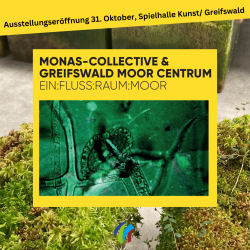
30/10/24 EIN:FLUSS:RAUM:MOOR, the joint exhibition by MONAS-Collective and Greifswald Moor Centrum, can be seen from 31.10.-7.12.2025 in the Spielhalle Kunst in Greifswald. It shows the mire as a sound and light artwork inspired by Caspar David Friedrich and his fascination with landscape. In the painter's anniversary year, the exhibition uses a combination of climate data, audio recordings, light projections and exhibits to invite visitors to experience the beauty and significance of peatland landscapes in an unusual way.
The artists captured the sound using soil microphones in the Kieshofer Moor and the Karrendorfer Wiesen. Together with data from greenhouse gas measurements by GMC scientists, these are converted into light pulses in the exhibition. The visitors present also influence the system, as the installation also measures CO2 values in the room in real time, for example.
The sound and image sculpture can be experienced free of charge from Wednesday to Sunday, 11 am to 5 pm.
There will be a free guided tour of the exhibition on 9th November at 2 pm. On 19th November, students of landscape ecology at the University of Greifswald will be presenting how climate issues can be communicated in other artistic formats in the Spielhalle Kunst. The Caspar David Friedrich Anniversary Office is offering a peatland walk combined with a final guided tour on 23rd November starting at 1 pm.
Applause with reeds
by Helena Plochberger (comments: 0)
Festive environmental award ceremony
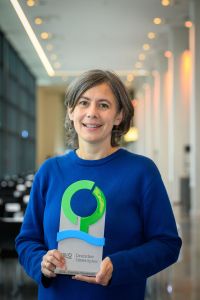
27/10/24 She works in the lecture hall, in the field and in parliamentary hearings - peatland researcher Franziska Tanneberger is the kind of scientist one would wish for. Engineer Thomas Seidel has developed the “Swiss army knife of electromobility” to combat Germany's “range anxiety”. Secretary General Alexander Bonde and Chairman of the Board of Trustees Kai Niebert told the press before the award ceremony that choosing the winner of this year's German Environmental Award was not difficult.
Tanneberger and Speidel aim to say goodbye to “burning” - in very different ways. The entrepreneur at ADS-TEC Energy is advancing electromobility with fast charging stations. The scientist at the University of Greifswald and co-director of the Greifswald Mire Center wants to stop oxidation by draining peat soils and shows the opportunities for natural climate protection through wet peatlands.
“We should not be content with regularly failing to achieve our climate targets,” says Tanneberger. She appreciates the award because it raises awareness for solutions and because it is a great recognition for the entire peatland team in Greifswald. Its representatives waved reeds for applause.
Federal President Frank-Walter Steinmeier also emphasized solutions in his speech: charging stations as self-evident as telephone booths used to be, he imagined. They were everywhere - except in the peatlands, Steinmeier said. In view of the climate crisis, its image is changing from sinister to beneficial. Signals, said Franziska Tanneberger, are sent to us by the peatlands even without a telephone box in them. She would like to use her share of the prize money to fund further research and implementation on climate and biodiversity protection in peatlands and their sustainable use.
About the German Environmental Award:
With the German Environmental Award, the German Federal Environmental Foundation (DBU) annually honors the achievements of people who make an exemplary contribution to the protection and preservation of the environment. The prize is endowed with a total of 500,000 euros and is presented by the Federal President. Here are the media reports from tagesschau and others.
Paludiculture in Ukraine
by Dorothee Scheuch (comments: 0)
New compendium by UNDP with expertise from Greifswald
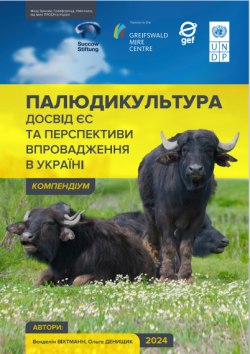
14/10/24 Northern Ukraine became the focal point of an ambitious project aimed at peatland restoration and climate protection. The Michael Succow Foundation (MSF), partner in Greifswald Mire Centre, jointed the United Nations Development Programme in Ukraine (UNDP) to provide expert support on paludiculture for the project “Promoting sustainable livestock management and ecosystem conservation in Northern Ukraine” funded by the Global Environment Facility (GEF) and the FOLUR platform (The Food Systems, Land Use and Restoration Impact Programme).
The project aims to transform 3 million hectares of land into a model for ecologically conscious agriculture, with a focus on reducing greenhouse gas emissions, enhancing soil fertility, and protecting endangered species. It embraces paludiculture, a sustainable form of wetland farming designed to reduce carbon emissions by rewetting and cultivating peatlands. Wendelin Wichtmann (Michael Succow Sitftung) was commissioned to assess its feasibility in Ukraine, with Olga Denyshchyk securing alignment with Ukrainian conditions. Their work included conducting a comprehensive desk study and producing a compendium of findings, which was made available in Ukrainian.
The compendium is intended for farmers, representatives of local communities, the scientific community, and civil society. Its purpose is to provide a scientific basis for the implementation of internationally recognized environmentally-oriented agricultural practices, particularly on wet peatlands, adapted to the unique conditions of Ukraine. The compendium also provides recommendations for the application of paludiculture practices on restored peatlands, combining environmentally-oriented solutions with economic efficiency.This is the first collection in Ukraine that contains scientific information about paludiculture a sustainable land-use method, already being implemented in European Union member states.
Invitation of the MoKKa project
by Dorothee Scheuch (comments: 0)
Closing conference at 7th Nov at Schwerin
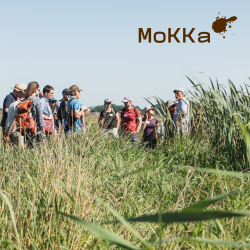
14/10/24 Germany’s peatlands are key to achieving our climate goals, but are we doing enough? As the final event of the MoKKa project approaches, the pressing question remains: How can we mobilize more stakeholders for effective peatland climate protection? On November 7th in Schwerin, this conference will bring together experts and decision-makers to explore innovative solutions and forge new paths forward. Currently, only 2,000 hectares of peatland are rewetted annually in Germany—an effort that falls far short of the 50,000 hectares per year required to meet climate targets. This gap highlights the need for immediate and extensive action. We must accelerate permitting processes, expand training programs for professionals, and engage the public in supporting peatland restoration as a vital tool for climate mitigation.The conference will focus on the following topics:
- Accelerating planning and permitting processes, improving land availability
- Building support structures
- Promoting peat formation – when and how?
- Climate education on peatland climate protection with the Peatland Suitcase (Moorkoffer)
The program offers ample space for exchange and discussions on solutions and past experiences. Among the speakers are Nathalie Niederdrenk (BMUV), Prof. Sabine Schlacke (University of Greifswald), Almut Mrotzek (Mooragentur MV), and Tom Kirschey (Competence Center for Natural Climate Protection). The conference, jointly organized by the Michael Succow Foundation, the University of Greifswald, and the Nature Conservation Foundation Deutsche Ostsee, addresses professionals, multipliers, and decision-makers in administration, business, education, and politics, as well as all those interested in peatland climate protection. Register by October 25th, 2024.
The MoKKa Project is fundedthe Federal Ministry for Economic Affairs and Climate Action (BMWK) is supporting the partners at the Greifswald Moor Centrum (University of Greifswald and Michael Succow Foundation) as well as the Nature Conservation Foundation Deutsche Ostsee (Ostseestiftung) from 2022 to 2024 through the National Climate Protection Initiative (NKI). The goal is to build capacity for the implementation of peatland climate protection in Mecklenburg-Western Pomerania and across Germany. More information can be found at www.mokka-projekt.de.
Climate-neutral building materials
by Dorothee Scheuch (comments: 0)
An opportunity for peatlands?
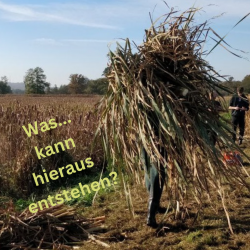
8/10/24 Agora Agrar and Greifswald Mire Centre invite you to the expert discussion ‘Climate-neutral building materials - an opportunity for wet peatland use’ on 14th November 2024, 14:30 - 20:00 at the dbb Forum Berlin Friedrichstraße.
On the way to a climate-neutral economy, the demand for biomass as a substitute for fossil raw materials - for example for building materials - is increasing. Biomass from the cultivation of wet peatlands - known as paludiculture biomass - can meet part of this demand and open up economic prospects for farmers on rewetted peatland sites. This requires new value chains, as the cultivation and utilisation of paludiculture biomass is still in its infancy. This requires a suitable political framework. Not only agricultural and environmental policy, but also climate and economic policy are of great importance here. The event will address both the potential of paludiculture biomass for the construction industry and the political scope for action that can enable and promote new value chains for the material utilisation of paludiculture biomass in the construction sector.
Registration is now possible until 31 October 2024 on this website: www.agora-agrar.de/aktuelles/klimaneutrale-baustoffe.











